Instant Karma, or, how American cinematic dominance evaporated virtually overnight
The strikes are having an adverse effect on the less glamourous side of the business, especially overseas, and ultimately, these unions are only hurting their own causes.
With far fewer American titles expected in Toronto should the dual Hollywood strikes persist, Toronto is expected to focus on centering international art-house cinema.
Sounds like the Toronto International Film Festival is moving on from a dominant American presence…
‘But more than 70 percent of the films at the festival are actually non-American films. And these films also pack theaters here in Toronto every year within the film festival,’ TIFF’s chief programming officer Anita Lee told The Hollywood Reporter.
If this was the case before the strikes, how long before the work stoppage allows that percentage to grow close to one hundred?
The U.K.’s booming studio sector — could be under serious threat should the SAG-AFTRA strike not be resolved soon.
So warns one studio boss, who says that the reliance of U.K. space on Hollywood productions (inward investment, almost entirely from U.S. studios and streamers, accounted for 86 percent of the 2022’s record $7.8 billon spent on film and high-end TV production in 2022) has put many facilities in the firing line.
If I’m responsible for the P&L of one of these properties, not only am I seeking to replace that revenue, but I would take every measure to make sure my facility is never in this position, again.
‘I think it’s potentially a disaster,’ says Nick Smith, joint managing director of the recently-opened Shinfield Studios, which currently has nine of its planned 18 sound stages open. Disney+’ Star Wars series The Acolyte recently wrapped…where it took over the first four stages that opened, but…a major new studio project would usually be waiting in the wings and booked to immediately…both the writers strike and now actors strike mean it’s now sitting empty.
…other U.K. facilities such as Ealing and Elstree — studios that largely work project to project — will likely also be ‘significantly’ impacted. But…established studios like Pinewood and Shepperton, which both have long-term leases in place for much of their sites (Pinewood with Disney and Shepperton with Netflix), should be ‘largely unaffected.’
I’d be extremely wary of doing business with American studios and production companies without getting paid up front – half, at least.
The studios in Hollywood would likely understand and oblige, then protect themselves on the back end in reducing labour costs wherever possible – likely actors’ and actresses’ salaries because it’s probably the easiest.
Clearly, neither union took into account any business ramifications before striking.
Studios and production companies in other countries may not entirely fill the void left by Hollywood, but they’ll fill some of it. When the Americans return, who’s to say that they’ll still enjoy the status of most valued clients, especially if the UK facilities have been able to negotiate longer-term leases with other producers from nearby countries (and more of them), and those revenue streams are reliable?
The unions may think that the strikes are harming or damaging the studios, and in the short term, that may be true – but if that was an objective of the job action, then not only was going on strike ill-advised and short-sighted, but self-destructive, too.
As of July 18, SAG-AFTRA had reached interim agreements with 39 independent productions, including movies from A24…and the Mel Gibson-directed, Mark Wahlberg-led Flight Risk. The Chosen, a crowdfunded TV series about the life of Jesus, also reached an agreement to finish filming on its fourth season.
My guess is that number will grow.
Mark Ruffalo’s suggestion that actors and actresses begin seeking roles in independent productions is a pretty good idea, especially if you are among the first to be cast and can negotiate an acceptable deal.
What he’s not taking into account, however, is that if independent productions become the norm, then the same law of economics that is so adversely effecting more than 85% of actors and actresses in the union at the moment, will do the same for actors and actresses vying for work on independent productions.
Additionally, if the union begins losing its members to what essentially are, “right-to-work” environments (something organized labour loathes even more than the studio heads and executives), does he think the union will not try to organize those actors and actresses working in those independent productions?
Fortunately for him, he’s never been accused of being smart – he’s never been mistaken for being smart, either.
‘Let me start by making something absolutely clear: This strike is not an outcome that we wanted,’ Sarandos said on an earnings call, noting that he grew up in a union household with an electrician father who had gone on strike.
Yes, let’s establish our union credentials to send the message, “I’m really one of you – I grew up in a union household, blah, blah, blah…” as if that somehow inoculates him from the scorn of the unions.
Sorry, Ted, but anyone who earns as much as $40MM in a year as a co-CEO1 can’t even begin to identify as a union guy – or even as one sympathetic to the union.
Here’s what he’s not saying: “Yeah, I remember when my dad’s union was on strike – we couldn’t pay the bills, or the mortgage, and we went to bed hungry so often I began to think it was normal. So when I finally got out of the house, I made damn sure my family was not going to suffer that way. Being on the business side of the industry may not be as glamorous as if one is an actor, but the pay is a hell of a lot more stable.”
This is nothing but a page out of Bill Clinton’s playbook – Bubba could not speak on any crisis that occurred during his presidency without somehow talking about how he had been affected by it while he was growing up. A church bombed, a school shooting – he couldn’t just discuss the tragedy of the event, he had to have a personal connection to it, even if he had to lie.
My sister made a most insightful observation that might explain such widespread support even among the ones who are struggling to make a living in TV and movies, and who ultimately will suffer the greatest amount of harm by this most self-destructive act.
Her observation was that for far too many of these actors and actresses, it’s just another show. The statements made by both sides, their timing, even the actions on the picket lines seem to be overly scripted, and that many appear to be “on” as if they are in front of a camera on a live take. It begs the question: Do they know what’s at stake here, really?
I think she’s on to something.
The pickin’s are slim on this, Day 6 of the double strike
– and there is little about which to crack wise.
All the same, dear reader, it is my hope that this was a worthwhile read, and I thank you for your indulgence.
Until next time…
https://www.cbsnews.com/news/netflix-shareholders-vote-pay-writers-strike/

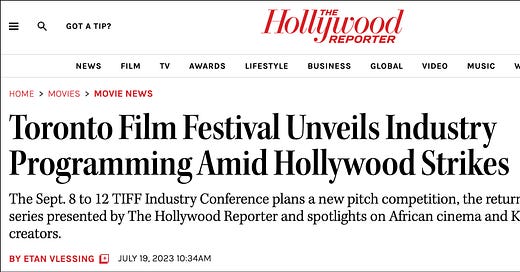


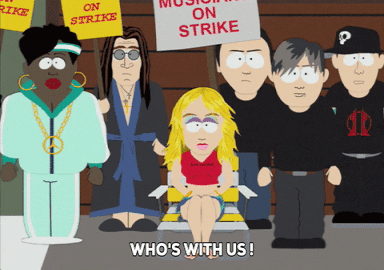

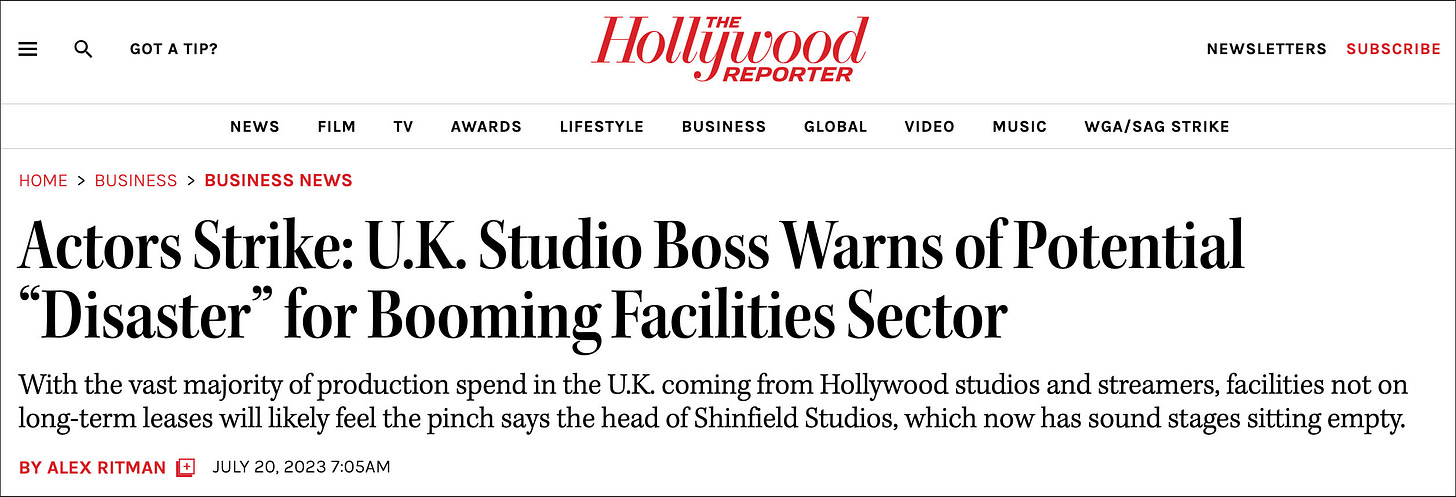
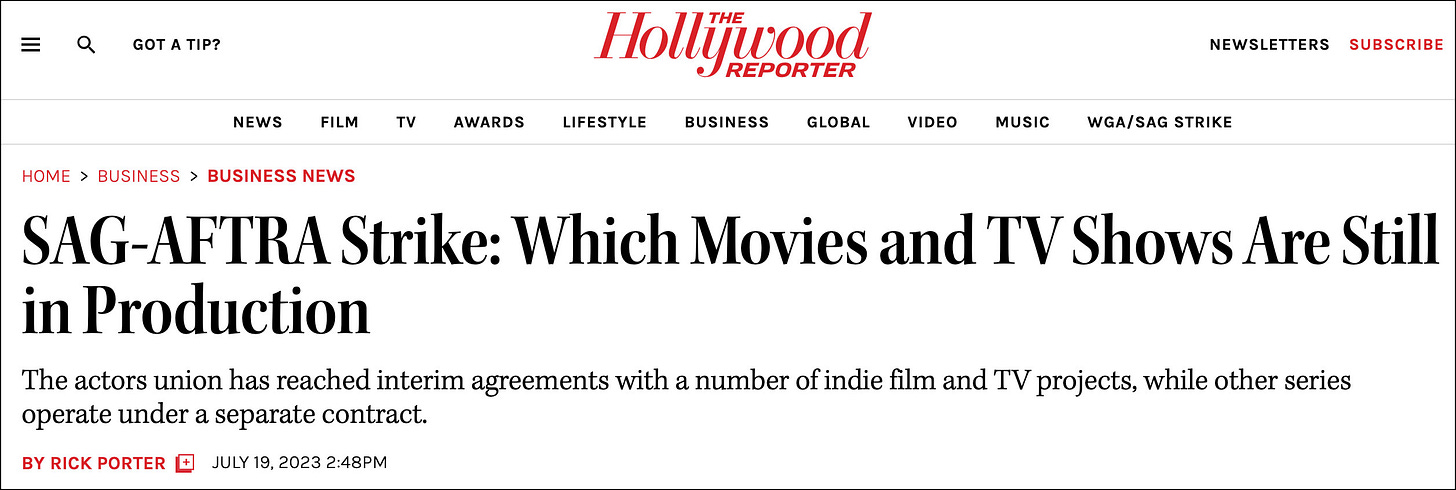
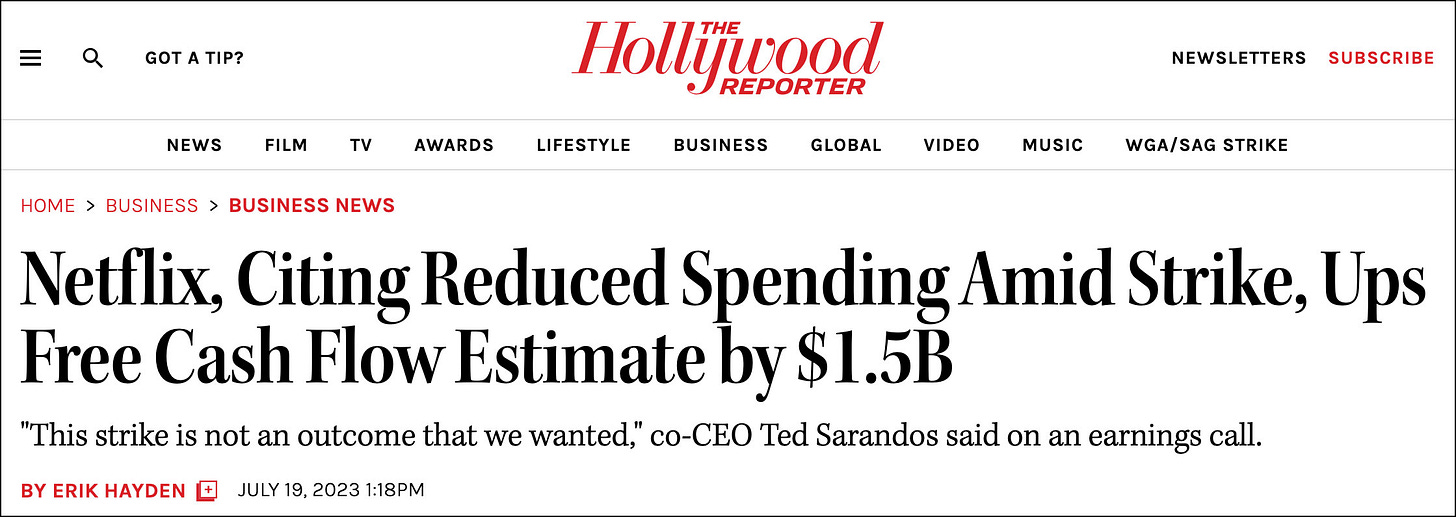
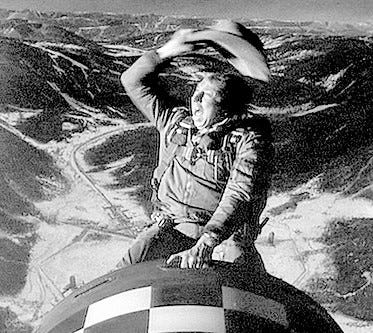
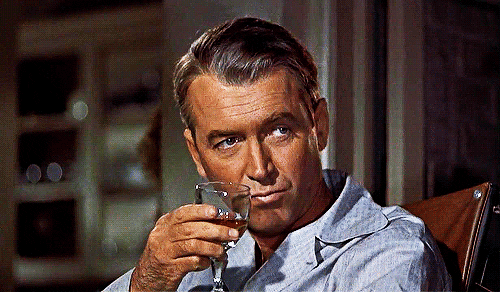
The reality is the return on investment for movie and television production is poor. The money to be made in entertainment is in the video game sector. The owners of these companies are not stupid. They know they are in a dying industry. It is not just because they are making Crappy movies or feature woke storylines. It is because the paying customers have more choices for entertainment and the technology to see these pictures without paying for them exists.
There is a seismic shift going on which will ultimately lead to many in the industry to have to learn to code.
If you live in a pretend world where everything turns out okay, of course you're going to get stuck there and think this is just another movie where the ending is pre-ordained. They might want to skip to the last page.
Scuba Cat made a comment on one of my posts about how this might drive the decentralization of the movie and TV industry. I honestly think that would be the best outcome.